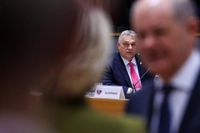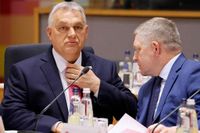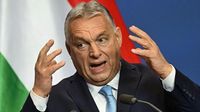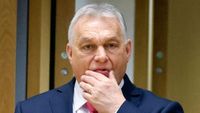In a clear sign of the mounting tensions within the European Union, leaders adopted conclusions supporting Ukraine at the European Council on March 20, 2025, excluding Hungary from the discussions once again. This marked the second instance in just 15 days that other EU members proceeded without Prime Minister Viktor Orbán, indicating his growing isolation among European counterparts.
"The diversity of views is not a new thing in Europe; what matters is our ability to live with that diversity," stated António Costa, the President of the European Council, during the press conference following the meeting. His words reflect a sentiment shared by numerous EU leaders, who are increasingly frustrated by Orbán's persistent refusal to support Ukraine amid the ongoing conflict with Russia.
The tensions came to a head during an extraordinary European Council meeting on March 6, where Lithuanian President Gitanas Nauseda expressed a similar frustration, declaring, "It's time to prevent one person from derailing the EU decision-making process." Such statements underline the precarious situation within the EU, as Orbán's actions continue to complicate collective responses to pressing geopolitical issues.
Orbán's reluctance to engage positively with Ukraine is rooted in various factors, including Hungary's historical contentions regarding the Hungarian minority living in Transcarpathia and his increasingly close ties with Russia. His government has consistently opposed military assistance to Ukraine, positioning itself as an advocate for peace while appearing at odds with the broader EU consensus.
Interestingly, Orbán had previously displayed a more nuanced approach when navigating EU matters related to Ukraine. For instance, in December 2024, he strategically exited a Council meeting during a vote on a Ukraine-related issue after successfully securing the release of €10 billion of previously frozen funds meant for Hungary. However, with his alignment shifting more towards an anti-EU rhetoric post-2016 and especially after the rise of Donald Trump in the United States, Orbán’s isolation within the EU has been unmistakably amplified.
As the EU braces for critical decisions later this year, the stakes grow higher. In July 2025, the Twenty-Seven will convene to vote on the renewal of sanctions against Russia, a move Hungary is poised to oppose. Should Orbán choose to obstruct this vote, it could spark a pivotal clash within the EU. Observers suggest that this current backdrop of exclusion serves as a warning to Orbán, especially noted by insiders from smaller EU states who have indicated that his actions could lead to significant geopolitical consequences.
Moreover, on March 15, 2025, during a speech laced with animosity toward his domestic opponents, Orbán declared, "We will liquidate this army of shadows," promising a "great Easter cleaning" to remove alleged threats within his political landscape. His rhetoric indicates a troubling descent into autocratic governance, veering towards actions that may further alienate Hungary from its EU counterparts.
Despite the heat of the debates, the question remains: Can the EU afford to sideline Orbán indefinitely, or will his disruptive influence force the Union to reconsider strategies on integrating Hungary? While current conditions do not permit any formal procedure for expulsion from the EU, mechanisms such as Article 7 of the European Treaty exist, allowing for the suspension of Hungary’s EU rights if violations continue. The implementation of this article has been considered, given Hungary’s increasingly authoritarian stance.
This month’s repeated exclusion of Hungary from crucial discussions signals a decisive step by EU leaders seeking to assert that consensus can be achieved without Orbán. Yet the fragility of EU unity hangs in the balance as the Union weighs its options for dealing with an increasingly combative member state. Amidst this turmoil, Orbán remains an influential figure for populist movements across Europe, representing a challenging paradox of governance and EU integration.
As the political landscape evolves, Orbán's actions may continue to inspire dissent among right-wing factions across Europe, challenging the foundational ideals of EU democracies. His government’s approach, combining nationalist fervor and alliance with Russia, pushes the question of what it means to share a collective identity within an increasingly diverse Europe.
The upcoming European summit in Paris on March 27, 2025, where Ukrainian President Volodymyr Zelensky is expected to address the leaders, will likely bring additional attention to the gaps in solidarity among EU member states. The ambiguity surrounding Hungary's future role within this framework remains a pressing concern as the geopolitical stakes escalate.




